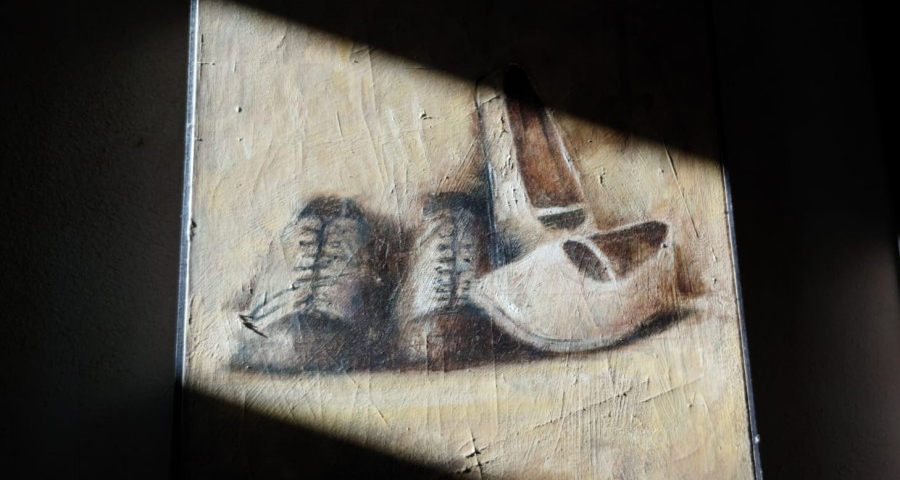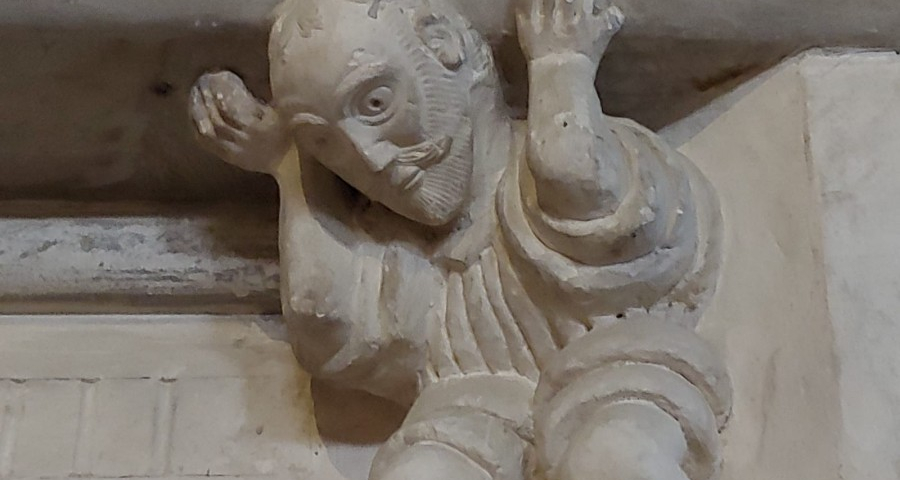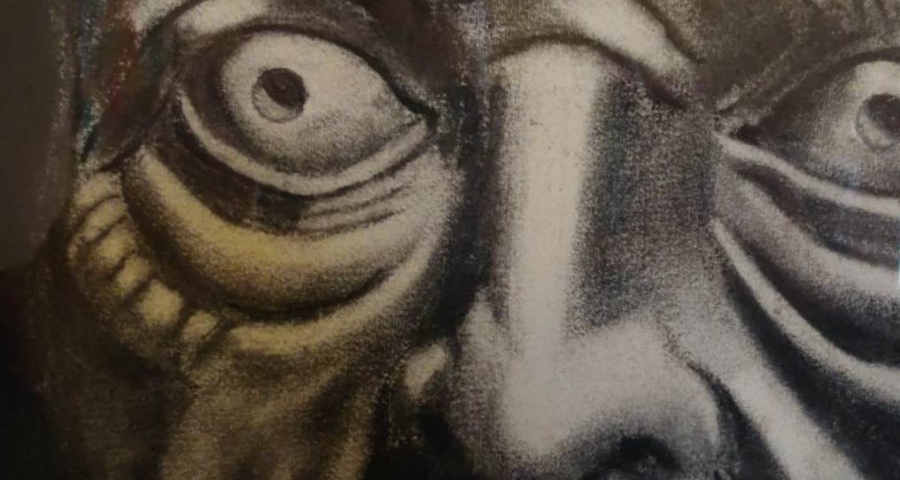The exile and the promise/ 16 – Love can save us from almost any evil, but it is not the tree of life
By Luigino Bruni
Published in Avvenire 24/02/2019
«Where is that life that I could have had but did not live...
Where is the anchor and the sea,
where is the oblivion of being who I am?...
Furthermore, I think of my partner
Who was waiting for me
and maybe is still awaiting me »
Jorge Luis Borges, That which is lost (Ciò che è perduto)
When the veils of illusion fall away and we finally see the bare truth, ours and of life, a time of veritable providence begins, almost always hidden under an initial layer of pain. An intimate and immediate one-on-one with your own soul and its inhabitants (including its skeletons and demons) begins. All ambivalences, ambiguities, large and small compromises and sins of the past impose themselves with their own and invincible strength. They speak to us and, with a hitherto unknown authority, ask and demand the truth of us. We suddenly wake up from the deep sleep in which we had fallen without knowing or wanting it, and a new, often better, phase of life opens up to us. Because in order to touch upon true salvation one must reach beyond the illusions and consolations that usually shield the ordinary conditions of life. In some existences these moments come only once, and it is a decisive moment, because it is the last one and only call. In it we are called by our first name; we turn around and answer again, knowing however that it will be the last time, because that first name is dying in order to be able to rise again.
«In the ninth year, in the tenth month on the tenth day, the word of the Lord came to me: “Son of man, record this date, this very date, because the king of Babylon has laid siege to Jerusalem this very day"» (Ezekiel 24,1-2). The days are not all the same. Some look alike, but there will never be two identical days. Then there are very few days that mark and break the arc of our life - our birth, wedding, the calling, our last day and the last day of the ones we loved so dearly. The day of the Babylonian siege of Jerusalem is perhaps the most important day in the history of Israel. It marks the end of an era, the wonderful one that began with David and Solomon five centuries earlier, and inaugurates a new phase of humiliation and defeat, but also of blessing and maturity of the people and a new way of conceiving and living faith, life, God-YHWH. Ezekiel (together with Jeremiah) had been heralding the arrival of this terrible day for years. This is why they scorned him, calling him a prophet of doom, a clown, a circus acrobat, a bizarre seer, never considering him someone to be taken seriously; in part because he spoke in the name and on behalf of YHWH who, while in exile and at home, had been joined, challenged and beaten by the more spectacularly performing and striking Babylonian gods.
And so, in a Jerusalem that could already see Nebuchadnezzar arriving with his troops on the horizon, the Jews celebrated while feasting on rich meals, deluded as they were by false prophets that their holy temple and the city of David could never be desecrated or defeated: «Put on the cooking pot; put it on and pour water into it. Put into it the pieces of meat, all the choice pieces - the leg and the shoulder. Fill it with the best of these bones; take the pick of the flock» (Ezekiel 24,3-5).
On the eve of a tragedy there is always someone who does the opposite of what he should be doing, who confuses the quail of the desert with the frogs of Egypt, the manna with the locusts, the banquet for the return of the prodigal son with that of the rich glutton. False prophets are regular attenders of wrongful banquets. They do it many times, they very frequently do it; but they won't always be able to do it, because sooner or later the day and moment of truth will come. Everything changes, and the banquets reveal their real and different nature: those who are good and fraternal will be evident in the light of the sun and will pass judgement on the wrong and bad ones.
On this different and terrible day Ezekiel calls his Jerusalem a "bloody city". Its inhabitants shed blood and did not cover it. They left it in full sight on the ground, and Ezekiel, while saying it and writing it, left it uncovered forever: «For the blood she shed is in her midst: She poured it on the bare rock; she did not pour it on the ground, where the dust would cover it» (Ezekiel 24,7). In general, the earth ends up covering the blood that we shed due to our wrongful doings, because if it didn't, our pain would be unsustainable. But, in a few terrible episodes, rather than being hidden, the blood in the Bible remains exposed on the ground. The message it contains is too important, and its power overcomes the intensity of the pain involved. The earth did not cover the bloodshed in Jerusalem, just as it did not cover that of the mild Abel before that (Genesis 4,10), or Job’s innocent blood: «Earth, do not cover my blood» (Job 16,18). The lands and earth in the Bible left these bloody places uncovered, for us to see and learn about the smell of innocent blood, so that we can recognize it when we find it elsewhere in the Bible (where it is often recurrent) and in life (where it is often, much too often recurrent).
While the text now brings us into the heart of the very serious political and religious events in Jerusalem, there is a twist, one of the most unexpected and powerful ones in the whole book. That terrible date marked not only the history of Jerusalem but also the personal biography of Ezekiel, imparting the deepest of wounds onto his life: «The word of the Lord came to me: “Son of man, with one blow I am about to take away from you the delight of your eyes"» (Ezekiel 24,15-16). Since the day of his calling, Ezekiel has been a sacrament, an incarnate symbol, a sign and total message: every true prophet is. He always spoke with his whole body and with his flesh. Now, having reached the heart of his book, Ezekiel also speaks to us through the flesh of his primary relationship: the spousal one. Our relationships are flesh, they are substance, and they are people (as Christianity will tell us). So I am body. Here, for the first time, Ezekiel prophesies with another kind of flesh: that of a relationship. He speaks to us using a body which is larger than his own - as Hosea and Jeremiah did: one marrying a prostitute, the other remaining a celibate to become a message of exile.
Ezekiel had said in so many ways that Jerusalem, «the delight of your eyes» (Ezekiel 24,25), would be destroyed and the people deported and exiled in Babylon without even having time to mourn (Ezekiel 24,22). Now, on that terrible day, he has one last resort left, and God allows him to use it. This is what prophecy is, in the Bible and in life. It's tremendous, it's beautiful, and it’s dramatic: «So I spoke to the people in the morning, and in the evening my wife died» (Ezekiel 24,18). A terrible sentence. Even that spousal blood becomes exposed blood and is left uncovered in the Bible, because, even here, we will learn to recognize the smell.
An episode, which is probably historical, and hence should not be read as a sacrifice that God asks of his prophet as a way to prove some form of faithfulness. The God of the prophets does not ask for these things. Ezekiel is not like Abraham, whom no ram reaches in time to save, saving a loved one. The story of Ezekiel only tells us, with the absolute power and certitude of prophetic language, where the real essence of a true calling can be found. When we reply in the affirmative to a true voice calling us and then set out, we know that we will no longer be the masters in control of any of the most important things in our lives, including our most intimate relationships. We lose control of our assets, because they all turn into the task, the destiny and the message. Our primary relational goods can also be found among these assets. This is also one of the deeper reasons behind the choice of celibacy that some prophets make. On the day of their calling, they come to realize that the gift of their entire body cannot involve a future wife, husband or children; and so they do not marry for a higher and unique form of responsibility. Others, like Ezekiel, get married (or were already married at the time of their calling), and their loved ones mysteriously enter their vocation as well, even when not actively choosing it (there are very few important things that we actually choose).
But this tragic event in Ezekiel's life also tells us something more. Widowhood, especially when young (Ezekiel was about 35 years old in 598 BC), is always to find yourself in exile, the destruction of a beautiful temple, the end of a great dream and a wonderful kingdom. It is therefore a great message about the human condition. Even though spousal love is the clearest symbol of heaven on earth, the food that most tastes of eternity, and yet not even this love can set us free from the ephemeral nature of life. Love can save us from almost any evil, but it is not the tree of life; and while it makes us wonderful, it still leaves us mortal. Outside of Eden, human love can and has at times touched eternity, but it has not truly equalled it.
Along with his wife Ezekiel also loses his voice, he becomes silent. The episode that the final editor of the book decided to place at the beginning of Ezekiel's calling, «I will make your tongue stick to the roof of your mouth so that you will be silent» (Ezekiel 3,26), it is probable that the prophet's biography dates back to the moment of the death of his bride - even if the choice to put that mutism in the first days of his calling makes sense in the economy of Ezekiel's prophecy, because it tells us that the loss of his spouse was a decisive event in the entire mission and "word" of the prophet. Ezekiel remained for many months with his tongue attached to the palate, perhaps for the entire duration of the exile of Jerusalem (a year and a half): «And you, son of man, on the day I take away their stronghold… on that day a fugitive will come to tell you the news. At that time your mouth will be opened; you will speak with him and will no longer be silent. So you will be a sign to them, and they will know that I am the Lord» (Ezekiel 24, 25-27).
Son of man... The phrase with which Ezekiel describes his wife ("delight of my eyes") would be enough to say that his being is truly and thoroughly "son of man". Only those who know the heart of the human condition can call a wife with these wonderful words. Ezekiel is all voice of God, but he is also all voice and flesh of man, like us. And therefore, just like it would happen to us, that day his voice died in his mouth as well, and he was unable to say anything. From being a true master of the word he found himself silent, with his words consumed by a strangled mourning «Groan quietly; do not mourn for the dead» (Ezekiel 24,17). During days like that you can only sigh, as long as you have a little bit of breath left; all words, even those of God, seize to speak. We have seen this, we still see it, and we will see it again. By continuing to brush against eternity, hoping to be able to touch it in the end, reaching a bit higher.
Download pdf article in pdf (212 KB)













